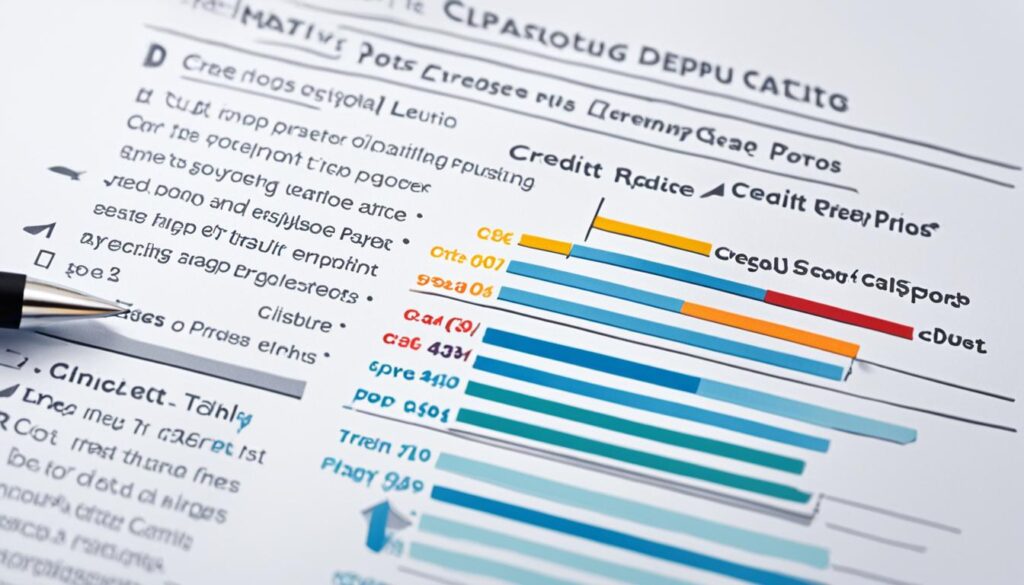Having a strong credit score is fundamental to buying a home, and mortgage lenders understand the importance of a good credit profile. This comprehensive guide will provide effective strategies to fix your credit and increase your chances of getting a mortgage approved. The article will explore options for improving your credit, addressing credit report errors, establishing good credit habits, managing finances, and utilizing credit monitoring services – all with the goal of helping you reach your dream of homeownership.
Key Takeaways
- Understand the importance of a strong credit score for mortgage approval
- Learn strategies to repair and improve your credit profile
- Discover how to address credit report errors and build good credit habits
- Explore options for managing debt and improving financial literacy
- Utilize credit monitoring services to maintain a healthy credit standing
Understanding Credit Repair and Its Significance
The credit repair process is a crucial step in enhancing your creditworthiness and increasing your chances of mortgage approval. Credit repair involves identifying and rectifying errors, inaccuracies, or outdated information on your credit reports. This includes resolving disputes, judgments, collection accounts, or other derogatory marks that may be holding back your credit score.
What Is Credit Repair?
Credit repair is the process of improving your credit history impact by addressing and resolving any credit report disputes or issues with the credit bureaus. This can involve the following steps:
- Reviewing your credit reports for any errors or inaccuracies
- Disputing any negative items with the appropriate credit bureaus
- Providing documentation to support your disputes
- Negotiating with creditors to remove or update negative information
- Implementing strategies to build a positive credit score repair
Credit Repair vs. Credit Rescore
While credit repair focuses on the long-term improvement of your overall credit history impact, a credit rescore is a more immediate, short-term solution. A credit rescore allows you to quickly update your credit score by providing new information or documentation to the credit reporting agencies. This can be particularly useful when you’re preparing for a mortgage application and need to demonstrate a higher credit score in a shorter timeframe.
Understanding the difference between credit repair and credit rescore is crucial in determining the best approach to improving your creditworthiness for mortgage approval.
Assessing Your Current Credit Situation
The first step in the credit repair process is to thoroughly review your current credit situation. This involves obtaining copies of your credit reports from the major credit bureaus and carefully examining the details. By understanding your credit standing and the factors affecting it, you can develop a targeted strategy to improve your creditworthiness and increase your chances of mortgage approval.
Reviewing your credit report is essential for identifying any errors or negative items that may be impacting your credit score. These could include inaccurate account information, incorrect payment histories, or even fraudulent activity. Addressing these issues is crucial for credit score assessment and improving your credit history evaluation.
| Credit Score Thresholds | Mortgage Approval Likelihood |
|---|---|
| 700 or higher | Excellent |
| 650 to 699 | Good |
| 600 to 649 | Fair |
| Below 600 | Poor |
By understanding your credit score thresholds and the impact they have on mortgage approval, you can better prioritize your credit repair efforts. This knowledge will guide you in developing a strategic plan to address any issues and improve your overall credit profile.

“Reviewing your credit report is the foundation of effective credit repair. It’s the first step towards understanding your financial situation and taking control of your creditworthiness.”
credit repair for mortgage approval
Accurately reviewing your credit reports and promptly disputing any errors you identify is a crucial step in the credit repair process. By carefully examining your credit reports, you can uncover inaccuracies that may be negatively impacting your credit score, hindering your chances of mortgage approval.
Understanding the Credit Dispute Process
The credit dispute process involves communicating with the credit bureaus – Experian, Equifax, and TransUnion – to address and resolve any credit report errors. This process begins with obtaining your credit reports, which you are entitled to receive for free from each bureau once per year.
Once you have your credit reports, thoroughly review them for any discrepancies, such as incorrect account information, incorrect payment histories, or erroneous public records. If you identify any credit report errors, you can initiate the credit dispute process by providing the credit bureaus with supporting documentation and a clear explanation of the errors.
Effective Communication with Credit Bureaus
Effectively communicating with the credit bureaus is crucial for a successful credit dispute process. When submitting your dispute, be sure to include all relevant supporting documentation that substantiates the errors you have identified. This may include payment records, account statements, or other evidence that demonstrates the inaccuracy of the information on your credit report.
Additionally, maintain clear and consistent credit bureau communication throughout the dispute process. Monitor the progress of your dispute and be prepared to provide additional information or clarification if requested by the credit bureaus.
| Key Steps in the Credit Dispute Process |
|---|
|

By taking the time to review your credit reports and effectively dispute any credit report errors, you can improve your credit profile and enhance your chances of mortgage approval. Remember, the credit dispute process may take time, but it’s a crucial step in the credit repair journey.
Establishing Good Credit Habits
Building and maintaining a strong credit profile requires the consistent practice of good credit habits. By focusing on key factors like on-time payments, credit utilization, and credit mix, you can take proactive steps to improve your creditworthiness and enhance your chances of mortgage approval.
On-Time Payments: The Foundation of Good Credit
One of the most crucial aspects of establishing good credit habits is making on-time payments. Payment history accounts for a significant portion of your credit score, and even a single missed or late payment can have a detrimental impact. Prioritize setting up automatic payments or payment reminders to ensure you never miss a due date.
Keeping Credit Utilization Low
Credit utilization, which measures the amount of available credit you’re using, is another critical factor in your credit mix. Aim to keep your credit card balances low, ideally below 30% of your total available credit. This demonstrates to lenders that you’re a responsible borrower who doesn’t rely heavily on credit to manage your finances.
Diversifying Your Credit Mix
Lenders also look for a healthy credit mix, which includes a variety of credit accounts, such as credit cards, installment loans, and mortgages. This diversity shows that you can responsibly handle different types of credit, which can positively impact your credit score.
Implementing Credit Building Strategies
- Opt to have your utility and subscription service providers report your payment history to the credit bureaus, which can help build your credit profile.
- Consider becoming an authorized user on a family member’s or friend’s credit card with a long, positive payment history.
- Explore secured credit cards, which require a refundable security deposit, as a way to establish or rebuild credit.
By consistently applying these good credit habits, you can take proactive steps to improve your credit score and increase your chances of securing a favorable mortgage approval. Remember, credit building is a journey, and with patience and dedication, you can achieve the financial goals you’ve set for yourself.
Paying Down Debt and Managing Finances
Effectively managing your finances and paying down debt are crucial steps in building credit and achieving your mortgage goals. By creating a detailed budget, prioritizing high-interest debts, and developing a structured debt repayment plan, you can make significant strides in improving your credit profile.
Creating a Debt Repayment Plan
Crafting a comprehensive debt repayment plan is a powerful strategy for debt management. Start by listing all your outstanding debts, their interest rates, and minimum payments. Then, prioritize your debts, tackling the ones with the highest interest rates first. Allocate as much as you can towards those high-interest loans, while still making minimum payments on your other debt repayment strategies.
Debt Consolidation Options
If you’re struggling to manage multiple debt obligations, debt consolidation may be a viable option. This involves combining your various debts into a single, more manageable loan, often at a lower interest rate. One popular debt consolidation method is a cash-out refinance, where you use the equity in your home to pay off your outstanding debts. This can streamline your payments and potentially lower your overall interest costs, further enhancing your creditworthiness for mortgage approval.
Alongside these strategies, maintaining a detailed budgeting and financial planning regimen is crucial for long-term financial stability and credit health. By taking a proactive approach to debt management, you can position yourself for a successful mortgage application.

“Paying off debt is the most powerful and liberating financial move you can make.”
The Role of Credit Monitoring Services
In the quest for mortgage approval, credit monitoring services can be a valuable asset. These services provide ongoing insights into your credit profile, empowering you to make informed decisions and take targeted actions to improve your creditworthiness.
By utilizing credit monitoring tools, you can regularly track your credit score, identify potential errors or negative items in your credit report, and receive personalized guidance on credit building. This holistic approach can be instrumental in your journey towards mortgage approval.
Credit monitoring services offer a comprehensive suite of features to support your credit repair efforts. Here are some key benefits they can provide:
- Regular credit score tracking to monitor your progress
- Detailed credit report analysis to uncover and dispute any inaccuracies
- Personalized credit building guidance to help you improve your creditworthiness
- Alerts and notifications to stay informed about changes in your credit profile
By leveraging the capabilities of credit monitoring services, you can gain valuable insights, address credit-related issues, and take proactive steps to enhance your financial standing – all critical factors in securing mortgage approval.
| Credit Monitoring Service | Key Features | Pricing |
|---|---|---|
| Credit Karma |
| Free |
| Experian |
| $24.99 per month |
| myFICO |
| $39.95 per month |
Investing in a reliable credit monitoring service can be a game-changer in your quest for mortgage approval. By staying informed and proactively managing your credit, you can position yourself for greater success in securing the financing you need.

Preparing for Mortgage Approval
To secure a successful mortgage application, it’s crucial to gather the necessary documentation and understand the lenders’ requirements for mortgage affordability. This preparation process can streamline the approval process and increase your chances of obtaining the best possible loan terms.
Gathering Necessary Documentation
Lenders will assess your financial situation in detail, so it’s essential to have the following documentation readily available:
- Recent pay stubs or income statements to verify your current earnings
- Tax returns from the past two to three years to demonstrate your long-term income
- Bank statements, investment accounts, and other asset information to showcase your financial resources
- Existing debt information, including credit card statements, loan balances, and monthly payments
Understanding Mortgage Affordability
Lenders will assess your mortgage affordability based on factors such as your income, expenses, and debt-to-income ratio. By understanding these criteria, you can better prepare for the mortgage application process and increase your chances of securing a loan that aligns with your financial situation.
| Metric | Explanation | Typical Lender Requirement |
|---|---|---|
| Income Verification | Lenders will review your employment history, income sources, and stability to determine your ability to make mortgage payments. | Consistent employment and income for at least the past two years |
| Debt-to-Income Ratio (DTI) | This ratio compares your monthly debt payments to your gross monthly income, helping lenders assess your mortgage affordability. | Generally, a DTI of 43% or less is preferred, but some lenders may consider higher ratios in certain circumstances. |
By carefully preparing the necessary documentation and understanding the lenders’ criteria for mortgage affordability, you can streamline the mortgage application process and improve your chances of securing the loan that best fits your financial needs.
Rapid Rescoring: A Short-Term Solution
In the quest for mortgage approval, borrowers often face the challenge of improving their credit scores in a timely manner. This is where rapid rescoring can be a valuable tool. Rapid rescoring is a technique that allows borrowers to quickly update their credit reports, potentially boosting their credit score improvement and enhancing their chances of securing favorable mortgage terms or qualifying for preferred mortgage loan programs.
The key advantage of rapid rescoring lies in its speed. Unlike the typical weeks-long process required by credit bureaus, rapid rescoring can update new information on a borrower’s credit report within days. This can be especially beneficial for borrowers who have recently paid off credit card balances or successfully disputed errors on their credit reports, as it allows them to promptly present their improved creditworthiness to lenders.
By leveraging rapid credit rescoring, borrowers can potentially qualify for better mortgage rates, lower down payments, or even access to mortgage loan programs that were previously out of reach due to their credit profile. This short-term solution can be a game-changer for those seeking to quickly update their credit and maximize their mortgage loan eligibility.
“Rapid rescoring can be a powerful tool for borrowers looking to improve their credit scores and secure more favorable mortgage terms in a short timeframe.”
However, it’s important to note that rapid rescoring is not a long-term solution and should be used strategically as part of a comprehensive credit-building plan. Borrowers should also be mindful of any fees associated with the rapid rescoring process and weigh the potential benefits against the costs.
In conclusion, rapid rescoring can be a valuable short-term solution for borrowers seeking to improve their credit profiles and enhance their chances of mortgage approval. By leveraging this technique, borrowers can potentially unlock new opportunities and secure more favorable financing options, ultimately paving the way for their homeownership dreams.
Conclusion
In the homebuying journey, credit repair plays a pivotal role in securing mortgage approval. By understanding the importance of credit repair, homebuyers can unlock valuable mortgage approval strategies and work towards their homeownership goals. Through a comprehensive approach that includes assessing your current credit situation, addressing credit report errors, establishing good financial planning habits, and leveraging credit monitoring services, you can enhance your credit profile and increase your chances of obtaining the mortgage that aligns with your financial needs.
Remember, the credit repair process may require time and effort, but the rewards of achieving homeownership can be truly rewarding. Embrace this journey as an opportunity to take control of your financial well-being and pave the way for a secure and prosperous future. With perseverance and a commitment to responsible credit management, you can turn your homeownership dreams into reality.
Embark on this credit repair odyssey with confidence, knowing that the path ahead may have its challenges, but the destination of homeownership is well worth the effort. As you navigate this process, stay focused on your goals, seek guidance when needed, and trust that your hard work will pay off in the end.
FAQ
What is credit repair and why is it important for mortgage approval?
What is the difference between credit repair and credit rescore?
How can I assess my current credit situation?
What is the process for reviewing and disputing credit report errors?
What are some good credit habits to establish for mortgage approval?
How can paying down debt and managing finances help with mortgage approval?
What role do credit monitoring services play in the credit repair process?
What should I do to prepare for the mortgage approval process?
What is rapid rescoring, and how can it help with mortgage approval?
Source Links
- How to Fix Your Credit to Get a Mortgage – https://www.jvmlending.com/blog/how-to-fix-your-credit-to-get-a-mortgage/
- Credit Repair for Mortgage Approval – https://www.debt.com/credit-repair/for-mortgage-approval/
- Mortgage Investors Group – https://migonline.com/credit-repair

